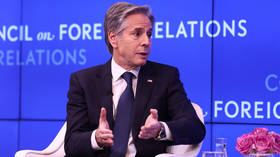Dow Chem pushes regulators to scuttle findings of pesticide study - report

Dow Chemical is pressuring Trump Administration regulators to withdraw biological findings that show three insecticides used on America’s fruit and vegetables are toxic for nearly all threatened and endangered animals and plants, according to documents.
The revelation comes from letters obtained by the Center for Biological Diversity, which show Dow’s lawyers asking the Trump administration and EPA Administrator Scott Pruitt to withdraw the findings finalized in January that confirmed the toxicity of the three organophosphate pesticides - chlorpyrifos, malathion and diazinon. Lawyers argue in the letters dated April 13, the scientific findings are fundamentally flawed.
“Dow’s message is clear: Corporate profits are more important than even the most common-sense measures to protect endangered animals and plants from harmful pesticides,”said Brett Hartl, government affairs director at the Center for Biological Diversity.
Federal scientists say organophosphates are harmful to about 1,800 critically threatened or endangered species. https://t.co/HognaM6dB3
— Lindsay Knake (@ReporterLKnake) April 20, 2017
In a statement, Dow said it asked for the assessment to be withdrawn because its “scientific basis was not reliable.”
FMC Corp., which sells malathion, said more time is need to compile the “best available” scientific data.
Makhteshim Agan of North America Inc, which makes diazinon, did not respond to requests for comment, according to AP.
The request comes after Pruitt announced last month he was reversing the findings of peer-reviewed studies that found that even tiny levels of exposure to the three pesticides could hinder the development of children’s brains.
Prior to his appointment as head of the EPA, Pruitt has a known history for aligning himself with the goals of corporations.
As Oklahoma Attorney General, Pruitt sued the EPA at least 14 times. Regulated industry companies or trade associations who were financial donors to Pruitt's political causes were co-parties in 13 of these 14 cases. These cases included suing to block the anti-climate change Clean Power Plan four times, challenging mercury pollution limits twice, ozone pollution limits once, fighting the Cross-State Air Pollution Rule and the Clean Water Rule, as well as fighting regulations on methane emissions.
EPA’s Pruitt refuses to ban dangerous pesticide despite agency’s findings https://t.co/n8fLTsIvcR
— Bob Colleton (@GhoulemsGhost) April 8, 2017
Under Pruitt, Oklahoma sued the EPA and lost on challenges to the EPA’s regulatory authority over mercury and other toxins, as well as pollutants responsible for creating regional atmospheric haze.
As Pruitt toured a polluted Superfund site in Indiana on Wednesday he refused to answer questions about Dow’s efforts.
A spokesman for the EPA agency later told AP that Pruitt won’t “prejudge” any potential rule-making decisions as “are trying to restore regulatory sanity to EPA’s work.”
Bayer refuses EPA request to halt insecticide use in US markets https://t.co/2L0noUxwxWpic.twitter.com/S3Vn4T3J6R
— RT America (@RT_America) February 5, 2016
Hartl said for decades the EPA refused to comply with its legal mandate to protect endangered species from the impacts of pesticides. Following a two-year review by the National Academy of Sciences, the federal government agreed to analyze the effects of three pesticides.
Supported by more than 10,000 pages of scientific documentation, the EPA’s final biological evaluation in January found that chlorpyrifos and malathion are likely to harm 97 percent of endangered species nationwide, among them frogs, fish, birds and mammals. While diazinon was found to harm 79 percent of protected species.
Dow hired its own scientists to produce a lengthy rebuttal to the government studies which were ultimately rejected the federal government.
Hartl said about 5 million pounds of chlorpyrifos are used in the US every day on crops like corn, peanuts, plums and wheat.
A 2012 study at the University of California at Berkeley found that an alarming 87 percent of umbilical-cord blood samples tested had detectable levels of chlorpyrifos.
About 1 million pounds of malathion, a neurotoxin used to control mosquitoes and fruit flies, is used each year.
In 2005, the Bush administration ordered an end to residential use of diazinon to kill yard pests such as ants and grub worms as determing that it posed a human health risk, particularly to children. The toxin is still approved for use by farmers who spray it on fruits and vegetables.
According to AP, Dow Chemical wrote a $1 million check to help underwrite Trump’s inaugural festivities, and its chairman and CEO, Andrew Liveris, heads a White House manufacturing working group.
Rachelle Schikorra, the director of public affairs for Dow Chemical, told AP any suggestion the donation was intended to help influence regulatory decision is “completely off the mark.”
The Dow request comes after four agencies – the EPA, National Marine Fisheries Service, US Fish and Wildlife Service and US Department of Agriculture invested four years assessing the pesticides’ impact on animal and plant species. The Fish and Wildlife Service and National Marine Fisheries Service were expected to release draft biological opinions for public review and comment by the end of May.
“Our government’s own scientists have already documented the grave danger these chemicals pose to people and endangered species,” said Brett Hartl, government affairs director at the Center for Biological Diversity.
“Unable to win on the facts, Dow is now adopting the same disgraceful tactics honed by the tobacco industry and the other climate deniers to try to discredit science and scrap reasonable conservation measures that will protect our most endangered animals and plants.”
The EPA and other agency assessments are required as part of a legal settlement from 2014 with the Center for Biological Diversity and other conservation organizations.













